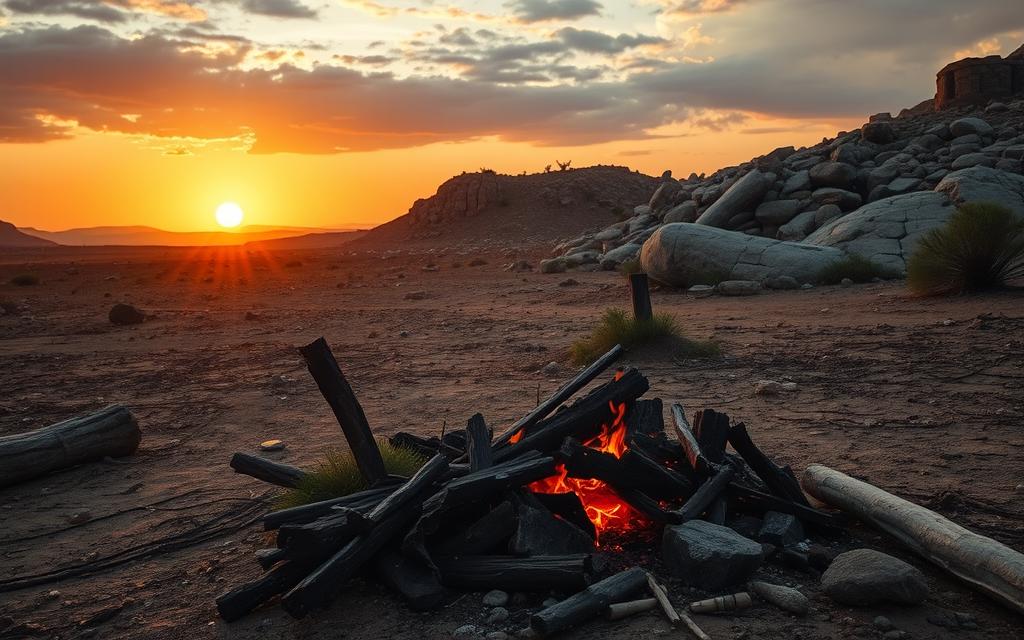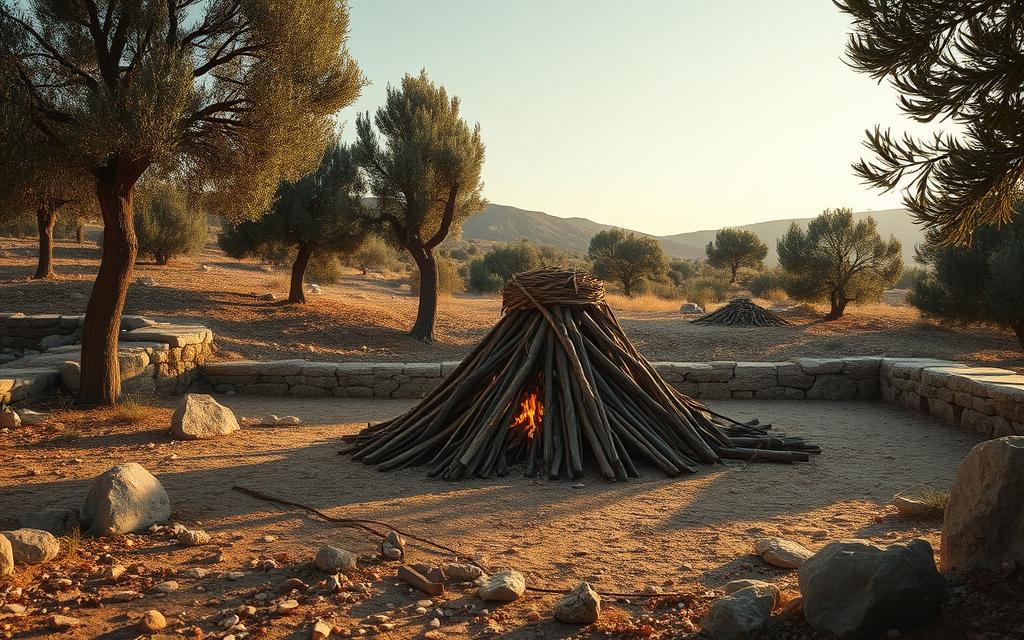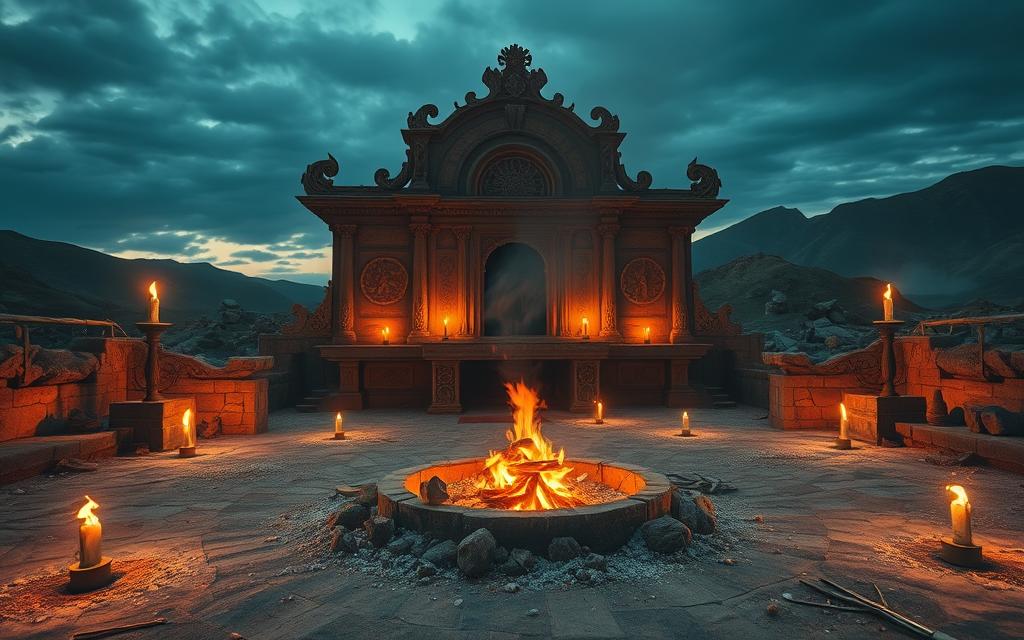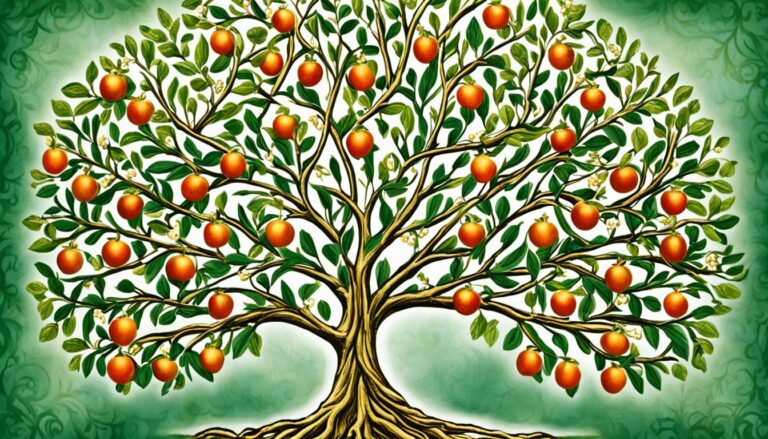First Person Cremated in the Bible: Ancient Funeral
What if honoring the dead could teach us deep truths about our beliefs? The concept of biblical cremation is not often talked about in the Bible. Yet, it shows us a lot about how people were buried long ago. Traditionally, burial was the usual way, like when Abraham buried his wife Sarah (Genesis 23).
However, the story of Achan in Joshua 7 shows us the first cremation in the Bible. This event is a big change from the usual burial. It also shows us the serious effects of sin in ancient Israel. By looking into this, we can see how burial and cremation were seen differently in the Bible. We also learn about the big impact these choices had on communities back then.
Understanding Biblical Cremation Practices
Exploring biblical cremation, we must understand its place in the Scriptures. Unlike ancient Israelites, who mostly buried their dead, cremation is rarely mentioned. Looking into both practices helps us see the cultural and spiritual values behind burial rituals.
Defining Cremation in a Biblical Context
Biblical cremation means burning a body after death, a rare act in early biblical stories. Burial was the norm, showing respect and honor for the dead. Cremation is often linked to judgment or sin, contrasting with burial’s deeper meaning.
Cremation Versus Traditional Burial in the Bible
Comparing cremation and burial in the Bible, we see Abraham and Moses were buried. This choice reflects cultural and theological views on resurrection and the body’s value. Though cremation isn’t condemned, burial is seen as a way to honor the dead and hold onto hope for the afterlife.
Significance of Burial Practices in Ancient Times
Burial practices in ancient times were deeply meaningful. They showed love and care for the deceased, using perfumes and spices. For believers, these practices connect with our views on death and eternal life. Burial was key to cultural identity, spirituality, and community in biblical times.
First Person Cremated in the Bible: Achan’s Story
Achan’s story is a powerful reminder of the consequences of sin in ancient Israel. It shows us the importance of following God’s commands. Achan’s actions, as told in Joshua 7, led to his execution by stoning and cremation. This makes him the first person cremated in the Bible.
This event is significant. It shows the severity of God’s judgment and how sin affects individuals and families.
The Sin of Achan and Its Consequences
Achan’s disobedience is a critical lesson for us. He took forbidden spoils from Jericho, driven by greed. This selfish act brought harm to the community and God’s wrath.
Through Achan’s story, we learn that our actions can deeply impact others.
Scriptural Accounts of Achan’s Punishment
Achan’s punishment is key to the Israelites’ story. The Bible tells us that Achan and his family were cremated. This was not just a punishment but a warning to others about disobeying God’s laws.
The flames that consumed Achan symbolized God’s wrath and the need for purity among His people.
Implications of His Cremation for Ancient Israelis
Achan’s cremation had far-reaching implications for the ancient Israelites. It reinforced their understanding of God’s holiness. By rejecting Achan’s burial rights, the community was reminded of their duty to follow God’s laws.
Achan’s story warns us of the severe consequences of sin. It shaped the moral fabric of Israelite society.

Historical References to Cremation in the Bible
Looking into the Bible, we find very few historical references to cremation. The Old Testament mainly talks about burial. But, stories like King Saul and his sons show cremation’s role. These stories help us understand the culture and beliefs of ancient times.
A Brief Overview of Cremation Mentions in Scripture
The Old Testament mentions cremation only a few times. This is compared to many mentions of burial. These instances of cremation in the Old Testament show it was rare. It was often used in special cases or as punishment.
King Saul and His Sons: A Case Study
The story of King Saul’s death and cremation is key. He and his sons were cremated to avoid disrespect. Then, their bones were buried. This shows cremation was used for practical reasons, not against burial customs.
Other Instances of Cremation in the Old Testament
King Saul’s story is not the only one. Other instances of cremation in the Old Testament also show its rarity. For example, Achan’s punishment shows the seriousness of sin. These stories help us think about our views on death and honor.
To learn more, check out this discussion on cremation and burial in the Bible. Thinking about these ancient practices helps us understand our own beliefs about death.
Significance of Cremation in the Bible
Exploring cremation in the Bible shows us different views on this practice. In ancient Israel, cremation was seen as shameful. This was different from the usual burial practices. Yet, cultures like the Greeks and Romans saw it as honorable.
For many Jews, cremation was a break from their sacred traditions. This shows how cremation’s meaning can vary greatly.
Cultural Perspectives on Cremation
Views on cremation vary widely across cultures. In some places, it’s seen as a sign of honor or beauty. But in the Bible, it’s often linked to punishment.
Today, cremation is more accepted, sparking debates about its place next to burial. Many still respect their ancestors’ burial customs, even as cremation gains popularity.
Contrasts Between Cremation and Burial
Burial was the norm in biblical times, with many important figures buried in tombs. This practice was seen as dignified and hopeful for resurrection. Now, cremation is more common, but many still question its implications.
The belief in God’s resurrection of His children comforts those making these choices. It helps them see beyond the physical act of cremation or burial.
Religious Texts and Their Influence on Cremation Practices
Religious texts offer a range of views on cremation. While the Bible doesn’t outright ban it, the lack of clear support can make some uneasy. Biblical stories highlight burial as the preferred method.
Understanding death, resurrection, and the afterlife shapes our views on cremation and burial. This is especially true for modern Christians. For more on this topic, check out what Christians should know about cremation.

Traditional Funeral Customs in Biblical Times
Looking into funeral customs in biblical times shows us the deep meanings of death and mourning. These customs, rooted in the Israelites’ practices, highlighted the importance of family and community. They helped people deal with the loss of loved ones.
Common Funeral Practices of the Israelites
The Israelites had rituals to honor the dead with respect. Washing and dressing the body showed care and respect. Public mourning let the community share in the grief, creating a bond of remembrance.
Influence of Cultural Norms on Burial and Cremation
Cultural norms greatly influenced burial and cremation in ancient Israel. Burial was seen as a sign of respect for the dead. Cremation was rare, used for special cases, showing the community’s preference for traditional burial.
The Role of Family in Ancient Funeral Arrangements
In ancient times, family was key in funeral planning. Family didn’t just prepare the body; they also supported each other during mourning. This showed how family and tradition were deeply connected, making it a community effort to remember loved ones.
Conclusion
Exploring cremation in the Bible shows us a mix of culture, spirituality, and history. Achan is seen as the first cremated in the Bible. Yet, ancient Israelites mostly chose burial, showing respect for the dead.
Abraham’s effort to bury Sarah is a great example. This shows how they valued life in their funeral choices.
The Bible views cremation with a focus on the body’s sanctity. This is seen in many verses. These practices show a deep respect for life and death, still meaningful today.
When deciding between cremation or burial, we must consider the history and spirituality behind it. This choice has deep implications.
Looking at ancient customs helps us think about our views on death and respect. It’s important to consider how past traditions guide us today. We should honor all lives, whether through cremation or burial.
For more on this topic, check out this article. It delves into cremation’s place in Christianity.







